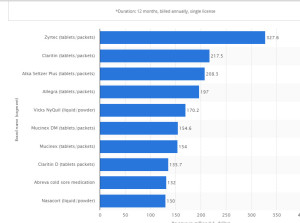 A huge percentage of the population experience some level of seasonal allergy symptoms. This is reflected in sales of over the counter allergy and sinus medications. According to Statista.com in 2014 the top 10 OTC allergy medications alone grossed close to 2 billion dollars in revenue.
A huge percentage of the population experience some level of seasonal allergy symptoms. This is reflected in sales of over the counter allergy and sinus medications. According to Statista.com in 2014 the top 10 OTC allergy medications alone grossed close to 2 billion dollars in revenue.

These nasal allergies are estimated to affect approximately 50 million people in the United States, and its prevalence is increasing affecting as many as 30 percent of adults and up to 40 percent of children.
If you are an allergy sufferer, you will recognize the symptoms.
- Itchy watery irritated eyes
- Headache, often on one side of the head
- Eye pain and or pressure
- Swelling around the face and eyes
- Stiffness in neck and or shoulders
- General feeling of fogginess
- A feeling of having a hot face may come and go, but without fever
- You may wake at night with sinus or head pain, even radiating down into the face or jawline
- It may feel like you have a head cold, but lack a cough or even sometimes a runny nose
Simply stated. Allergies are no fun.
How do you know when to visit your doctor?
If symptoms persist for more than 7 days without getting any better, it is a good idea to visit your doctor. When left untreated chronic allergies can become a sinus infection. During the visit the doctor will take a look in both your ears and nose with an otoscope. Visually you can see nasal passage drainage and or congestion as well as establish the condition of the inside nasal and ear canal cavities. Inflammation, surface roughness and mucus are a dead giveaway for an allergic reaction to environmental particles.
At that time, through discussion, you and your practitioner can come to a conclusion on the best customized treatment for you.
It may involve:
Using a saline wash kit (not a Neti-Pot – though they have become very popular they do not offer enough pressure other than that gravity applies to really get up and into the sinus passageways. They may offer some relief and certainly do not hurt to use, but these squeeze bottles with some force are preferred).
Choosing an antihistamine that may also have a nasal decongestant. Not every antihistamine works on every person. If you have already experimented with them in the past and know what does and doesn’t work for you, please advise your doctor during your visit.
He or she may advise you to use a non-steroidal anti-inflammatory spray which will help on a regular continual basis to block allergens and keep you feeling well during allergy seasons. These can be found over the counter at all drug stores. *When using these sprays, make sure to use the saline wash first. Wait 5 minutes, blow your nose, and then spray as directed.
Another option that may be chosen if your allergies are at a critical point where you are experiencing severe symptoms is to give an injection of an anti-inflammatory steroid. This is intended to help halt allergy symptoms far more quickly and get a jump on heading off a possibly forming sinus infection at the pass. This shot is administered intramuscularly directly in the arm close to the shoulder area. You will feel a stinging sensation which may spread across your arm and last for up to 5 minutes. It is best to sit or lay back for a few minutes after a shot is given as everyone reacts differently.
Following these steps, you should find that you are feeling relief within a day or 2. If your symptoms continue or get worse you may already have a respiratory infection and need antibiotics. It is advisable to check in again with your physician and follow up.
Avoiding allergens is the best course of action, but not always possible. Taking care of yourself proactively is always recommended.
To locate the best General Practitioners and or Otolaryngologist in your area please visit Independent Physicians Association of Lee County http://ipalc.org/ and search their database of qualified, verified and trusted physicians.
Share on Facebook



 Southwest Florida Medicine.com is dedicated to bringing you the very best health information available today!
Subscribe or check back regularly!
Southwest Florida Medicine.com is dedicated to bringing you the very best health information available today!
Subscribe or check back regularly!